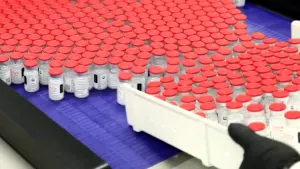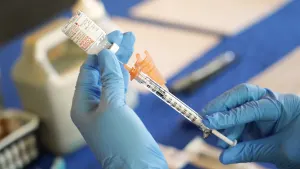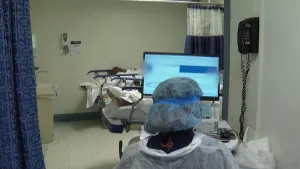Moderna says updated COVID-19 shot boosts Omicron protection
Moderna's experimental COVID-19 vaccine that combines its original shot with protection against the Omicron variant appears to work, the company announced Wednesday.
Share:
More Stories

Nobel in medicine goes to 2 scientists whose work enabled creation of mRNA vaccines against COVID-19
698ds ago1:25

Pharmacies say they have not received orders for newest COVID booster
703ds ago0:21

Biden administration announces $600M to produce COVID tests and will reopen website to order them
710ds ago0:41

Gov. Hochul: Updated COVID-19 vaccine to be available in NY in the coming days
717ds ago2:13

NYSDOH: COVID numbers up with new variant accounting for 17% of new cases
751ds ago2:30

NYSHD: Hospitalizations caused by COVID increase by 22% in a week
759ds ago
Nobel in medicine goes to 2 scientists whose work enabled creation of mRNA vaccines against COVID-19
698ds ago1:25

Pharmacies say they have not received orders for newest COVID booster
703ds ago0:21

Biden administration announces $600M to produce COVID tests and will reopen website to order them
710ds ago0:41

Gov. Hochul: Updated COVID-19 vaccine to be available in NY in the coming days
717ds ago2:13

NYSDOH: COVID numbers up with new variant accounting for 17% of new cases
751ds ago2:30

NYSHD: Hospitalizations caused by COVID increase by 22% in a week
759ds agoModerna's experimental COVID-19 vaccine that combines its original shot with protection against the Omicron variant appears to work, the company announced Wednesday.
COVID-19 vaccine makers are studying updated boosters that might be offered in the fall to better protect people against future coronavirus surges.
Moderna's preliminary study results show people given the combination shot experienced an eight-fold increase in virus-fighting antibodies capable of targeting the Omicron mutant, the company announced.
Today’s COVID-19 vaccines all are based on the original version of the coronavirus. They’re still providing strong protection against severe disease, hospitalization and death even after the appearance of the super-contagious Omicron variant -- especially if people have had a booster dose.
But the virus continues to mutate rapidly in ways that let it evade some of the vaccines’ protections and cause milder infections.
So U.S. regulators, and the World Health Organization, are considering whether to order a change in the vaccine recipe for a new round of booster shots in the fall -- when cold weather and kids returning to school are expected to drive yet another surge.
Key questions: How to make that change without losing the continued strong protection against COVID-19’s worst outcomes? And what’s the right variant to target? After the huge winter Omicron surge, that mutant's genetically distinct siblings now are the main threats, including one that’s fueling the current U.S. wave of infections.
The Food and Drug Administration has set a meeting in late June for its scientific advisers to debate those questions and evaluate data from vaccine makers’ tests of potential new formulas. Pfizer also is studying a combination shot, what scientists call a bivalent vaccine.
Moderna said its new study found that a month after the combo shot, recipients harbored higher Omicron-fighting antibody levels -- and cross-protection against other prior variants - than the original vaccine triggers. However, antibodies naturally wane so it’s not clear how long the protection against infection will last.
The study was performed in 437 people, and safety was similar to today’s boosters, Moderna said. The results were announced in a press release and haven’t undergone scientific review.
More from News 12
3:11

New Jersey man credits Parkinson's medication for transforming his life
1:30

American Heart Association outlines risks of ultra-processed foods
2:23

Lung cancer remains the deadliest cancer in the US. Here's what you need to know
1:23

FDA to add new warning labels to prescription opioid pain medications
2:16

Imminent public health threat for rabies issued in Nassau County
2:11
